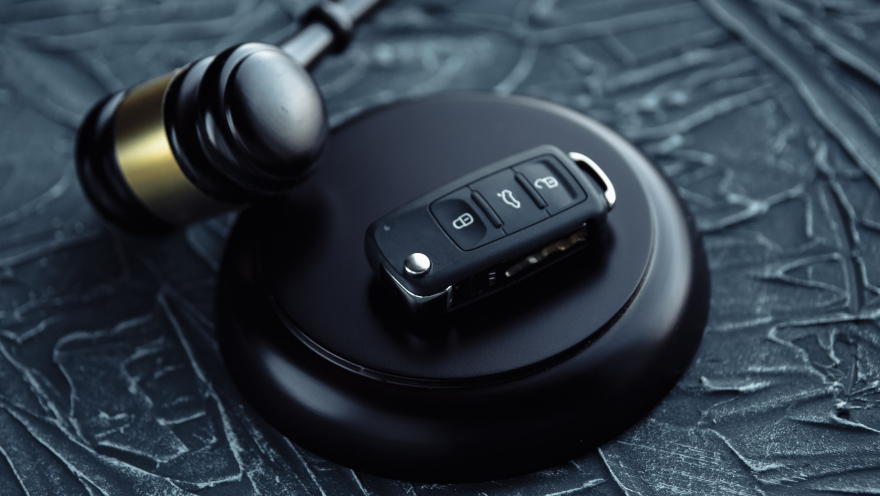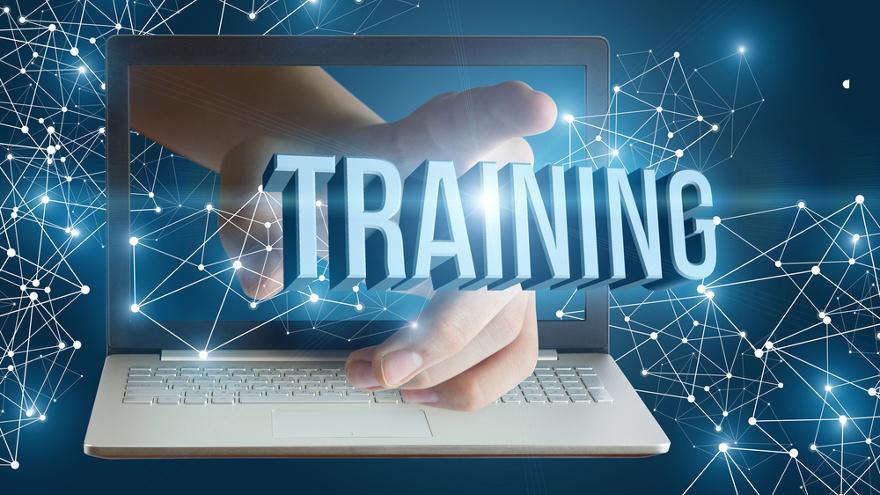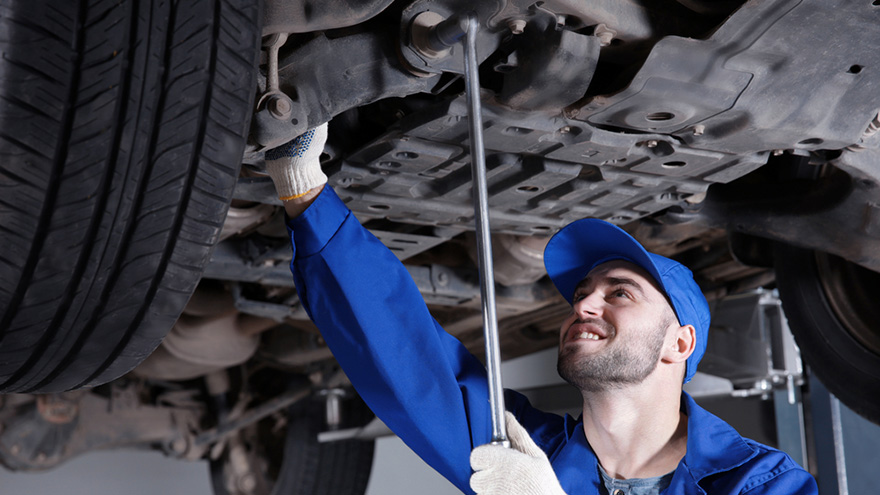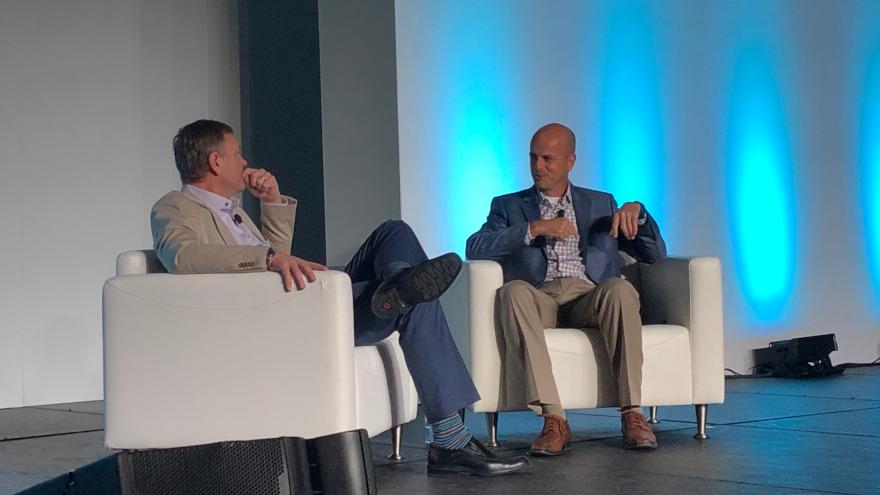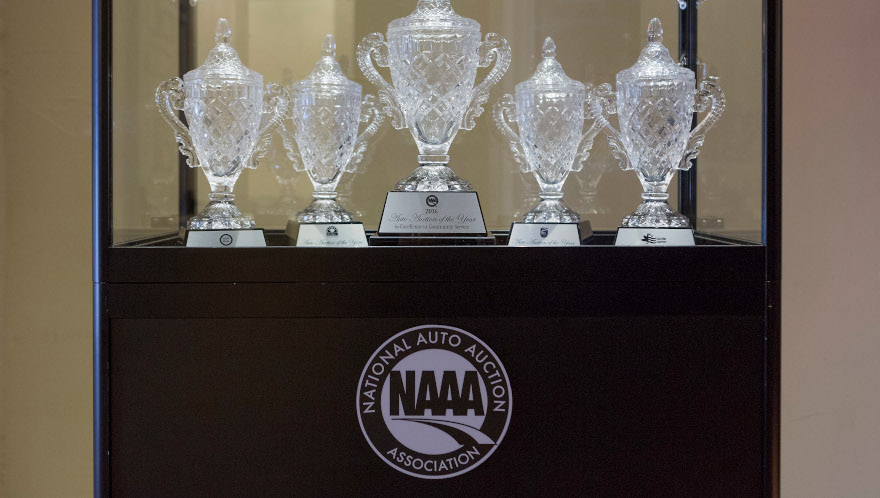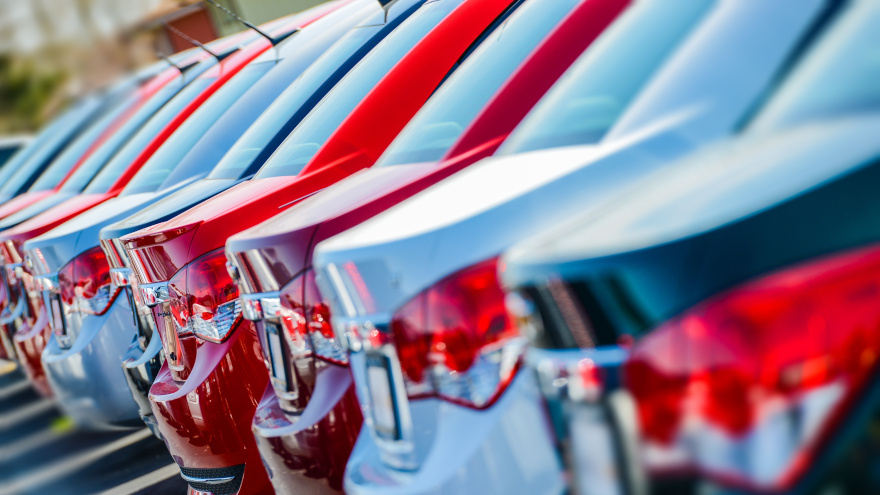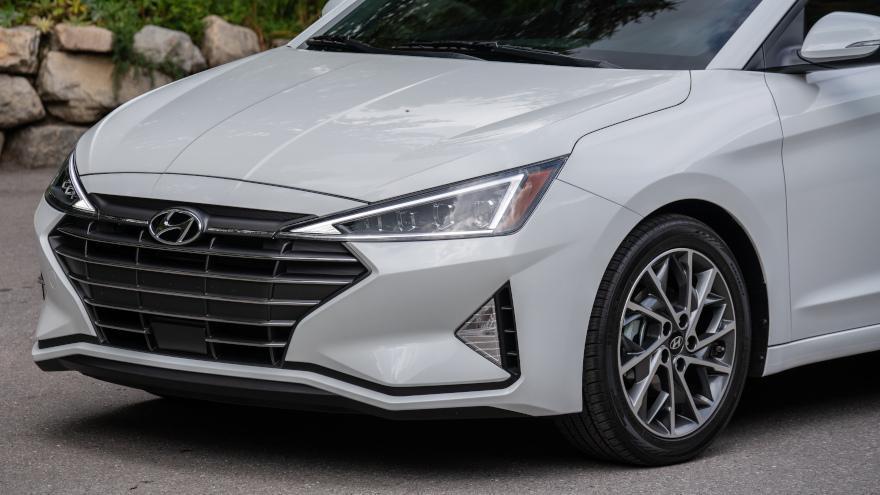Manheim said Wednesday that it is not permitting buyers or sellers to come to its auctions on sale or non-sale days, unless it is to preview sale inventory or for vehicle pickup/delivery — provided staffing and local ordinances allow for it.
The auction company shifted all of its sales to Simulcast-only on Monday, a move that will last until April 3, “at least.”
“Effective immediately, we are taking stricter measures to help slow the spread of COVID-19. All auction facilities are now closed to buyers and sellers on both sale and non-sale days, with the exception to preview sale inventory on the lot and vehicle pick-up and delivery, as staffing and local ordinances permit,” Manheim president Grace Huang said in a statement Wednesday.
“We highly recommend that clients use the remote seller tool to rep their vehicles. Transactions such as payments and arbitration will be handled in alternate ways. As always, please know we are taking these measures with safety top of mind,” she said.
Meanwhile, ADESA, which also has gone to a simulcast-only format for the time being, said on its website it has closed its ADESA Fresno location through the end of the month in accordance with city’s Emergency Shelter-in-Place Order.
And with Nevada’s Declaration of Emergency, the auction company has closed its ADESA Las Vegas and ADESA Reno locations through April 16.
In related auction industry news, the National Auto Auction Association has dedicated its website to providing COVID-19 updates and serving as a resource center.
“You will find links to news, reports, advisories, and announcements gathered from health authorities, state and federal governments, business organizations, the auto auction industry, and our membership,” NAAA said in a note emailed to members Thursday.
“Our goal is to keep you informed and prepared during this time of uncertainty by ensuring a continuous flow of communication among the automotive community.”
NAAA is holding a weekly teleconference call with ADESA, Independent Auction Group and Manheim leaders to share updates and best practices related to COVID-19 response.
More information is available at www.naaa.com.
Correction: An earlier version of this story incorrectly said ADESA Las Vegas and ADESA Reno would be closed through April. They are closed through April 16.
A free COVID-19 Coronavirus Resources Center from KPA includes features such as training courses that cover COVID-19 coronavirus awareness, housekeeping, basic first aid awareness, health and wellness and hazard communication.
KPA is a software, consulting services, and training provider in the areas of environment, health, and safety and workforce compliance. The company says it works to create “safer work environments for employees.”
The company released the free COVID-19 Coronavirus Resources Center on Thursday, saying the site is geared toward employers needing information on keeping a healthy and safe workforce.
The site also features webinars covering best practices in remote work programs and how to manage coronavirus (COVID-19) anxiety and safety at work.
KPA experts with more than 30 years of environmental, health and safety experience worked to develop additional materials for employers. Those include a COVID-19 resource pack.
The resource pack includes a Coronavirus Workplace Prevention and Hygiene Training Packet. It also includes two checklists covering facility and personal hygiene and preparedness.
The five safety training courses are already available to KPA customers that use Vera Suite and the Risk Management Center.
KPA says that as society continues to navigate the coronavirus pandemic, it will continue updating the Resource Center with additional information and resources.
“KPA is committed to helping organizations keep their workforce healthy during the coronavirus pandemic,” KPA president and chief executive officer Chris Fanning said in a news release.
Fanning continued, “It’s KPA’s responsibility to pool our resources and do our part to keep employees and the communities where they work and live healthy and safe.”
Noting the decisions help address the health of dealership customer personnel and Rapid Recon employees because of COVID-19 travel concerns, Rapid Recon is temporarily suspending its onsite training and expanding its online training program.
Rapid Recon, a vehicle reconditioning technology company, says it has expanded its team of process performance management experts by 50%. The company said it is doing that “to maintain the highest levels of customer performance and support.”
In addition to its online support team increase, the company also retained the services of various video online training companies to assist in the expansion.
Rapid Recon over the past 10 years has developed an online training protocol that more than 2,000 dealers nationwide and in three countries use.
Rapid Recon also said February was a record-breaking sales month for the company. More than 70 new dealer partners joined Rapid Recon to improve their inventory turn, per-vehicle revenue and unique sales advantages.
The company announced two new products at the NADA show: Vendor Advantage and Live Locate. Rapid Recon also added six new team members to meet market demands for its vehicle reconditioning software.
“The safety and well-being of our customers’ personnel and of the Rapid Recon team is our top priority, as it has always been,” Rapid Recon chief executive officer Dennis McGinn said in a news release.
McGinn continued, “We will continue to monitor the circumstances surrounding the coronavirus, and we will be taking necessary precautions to ensure our continued service and support to the automotive industry.”
Working to help dealerships provide test-drive services to shoppers who are practicing social distancing, DealerSocket’s DealerFire is offering its Delivery Test Drive Integration free of charge for the next 100 days to its dealership customers who use the company’s Engine6 website platform and customer relationship management.
That will allow dealers to contact, schedule and deliver vehicles to a customer’s home or office, according to DealerSocket.
DealerSocket director of product marketing Cavan Robinson said the program “keeps the cogs of the auto buying experience running at full speed during this time.”
With the announcement, the company is doing the right thing for its customers “by being there for them, helping when they still need to provide outstanding service and support to their clients,” Robinson said.
Robinson continued, “No matter what is happening in the world, DealerSocket’s ‘white-glove’ customer service never rests.”
Test drives outside the dealership are one of the offerings of DealerSocket’s Delivery Test Drive Integration. Shoppers can request a test drive at any location. Dealers can set location radius and pricing thresholds.
Noting the customer convenience that the program offers, DealerSocket said that from the comfort of their home or office, consumers can navigate the car shopping process online.
With native DealerSocket CRM integration, all test drive appointments are automatically synced with DealerSocket CRM sales opportunities and appointment scheduling.
As the potential coronavirus impact continually grows, a wide swath of industry associations representing dealerships and repair shops are urging federal, state and local officials to consider the importance of motor vehicle supply and repair facilities in implementing orders to close nonessential businesses as a result of COVID-19.
The actions began with John Bozzella, president and chief executive officer of the Alliance for Automotive Innovation and National Automobile Dealers Association president and chief executive officer Peter Welch sending a joint letter to President Trump.
“As our nation continues to confront the coronavirus’s challenges, we want to underscore the importance of ensuring that consumers have access to a safe and well-functioning motor vehicle fleet,” Bozzella and Welch wrote in their letter. “Motor vehicles, both new and old, are critical to ensure that the public can get food and other necessities of life, as well as to continue to interact with one another in a manner consistent with public health officials’ recommendations. This applies not only to light-duty vehicles but also to the medium and heavy-duty trucks that are a crucial component of the nation’s transportation infrastructure.
“In fact, the federal government includes manufacturing (including auto manufacturing) as critical infrastructure when it comes to the economic continuity of the United States. Given the importance of safe transportation in addressing the coronavirus outbreak, we have an obligation to ensure that motor vehicles remain safe and are properly maintained,” they continued.
“To that end, it is vital that vehicle repair, maintenance, and sales facilities be considered essential operations when federal, state, and local officials impose certain requirements due to the coronavirus outbreak,” Bozzella and Welch went on to say.
Cody Lusk, president and chief executive officer of the American International Automobile Dealers Association (AIADA) shared a similar message. In a separate statement, Lusk emphasized that dealerships and their service shops are essential to the communities they serve.
“These are uncharted waters for all of us. As Americans determine the best way to move forward and protect each other, AIADA asks that lawmakers keep in mind the tremendous value dealerships offer their cities and towns, and the many important services they perform — from brake repairs to addressing critical recalls to providing vehicles to essential workers who can no longer rely on public transportation,” Lusk said.
“Dealers are working around the clock to ensure compliance with CDC guidelines and establish safe conditions for both their employees and customers. Local governments should allow them to continue to make available the essential services their communities require,” he added.
Meanwhile, six other trade associations representing the transportation industry, including the Auto Care Association, called on state and local governments to take these actions in a letter.
“Essential tasks rely on safe and efficient transportation. Government vehicle fleets (local, state and federal) and other essential personnel (doctors, nurses, healthcare provider, grocers, etc.) depend on businesses that support the safe operation of the transportation sector. Public and private transportation services are necessary to ensure the public may complete essential trips, including purchasing food and medicine or caring for loved ones. Businesses that provide the support or supplies necessary to operate must therefore also be deemed essential,” these six associations wrote.
The letter continues to urge, “the careful implementation of policies that restrict movement and business operations to ensure that businesses that provide critical support for public care and well-being are excluded from such restrictions.”
In addition to the Auto Care Association, the letter was signed by the U.S. Tire Manufacturers, American Trucking Association, Motor Equipment Manufacturers Association, Tire Industry Association and Automotive Oil Change Association.
UPDATE: McConkey Auction Group, whose auctions are members of ServNet, said Wednesday afternoon that all of its sales will be virtual "until further notice." More details can be found in this LinkedIn post.
In an update shared Tuesday, independent auction group ServNet said its members are currently still holding sales as regularly scheduled, though some have local government-mandated modifications.
However, the group is urging customers to participate through online platforms when possible.
“ServNet Auctions are locally owned and operated family businesses that are active members of their communities. When necessary and at the discretion of local ownership decision, ServNet auctions may be altering operations to ensure the safety of all employees and customers alike,” the group said in a statement.
ServNet also noted that customers should confer with their local auction for scheduling specifics or any changes.
“In the rapidly evolving situation we are all experiencing, ServNet auctions will continue to stay in touch with all customers, and will always be reachable,” ServNet executive director John Brasher said in the release. “As usual, if you have any specific questions or comments, please reach out to your local ServNet Auction. You will find a concerned owner on site ready to help.
“Special thanks to our great family of buyers, sellers and employees. With the cooperation and patience of all, we will be able to get through this safely and as quickly as possible.”
In the overall independent auto auction community, locations have continued to share updates throughout the week.
On Monday, Greater Rockford Auto Auction shared via LinkedIn: “Effective Immediately and through March 30th (the next 2 auctions), we will be moving to an internet only simulcast sale on Wednesdays. Buyers will only be able to bid on vehicles through our simulcast online buying capabilities.
“Due to an increase in online bidding please verify that you can log on to Edge Pipeline before sale day! For assistance please contact us at 800-830-4722,” the auction said.
In a “Bob’s Market Message” post on Saturday, McConkey Auction Group president and chief executive officer Bob McConkey said: “Well, we are most certainly experiencing unique times. The effects of the Coronavirus outbreak continue to evolve and significantly disrupt our lives. The social, psychological, and economic impact is serious.
“The mystery — the big question in all of this — is how do we appropriately react as an individual and as a business? We are all in uncharted waters. There are all of the standard, well-publicized precautions about hygiene, social distancing, etc. There are the government recommendations and mandates. There are specific events and ongoing social and entertainment businesses that are tragically forced to close,” McConkey said.
“Then there is us — auctions and auto dealers. All of you are open for business and for many, business is good. For us, it is complex,” he said.
“As of this writing, we are going to continue to offer vehicles in the lanes and welcome our customers to our facilities. We will offer 100% of our inventory via Edge Simulcast and will encourage folks to attend, buy and sell remotely as a viable option. For this coming week, we will credit back your online simulcast fees with purchases of 3 or more units via simulcast. These credits will go toward future simulcast purchases.”
In a LinkedIn post earlier this week, Music City Auto Auction of Nashville said it had hired Ecovasive Southeast Infection Control to disinfect the facility prior to the auction’s Tuesday sale.
MCAA said the virus control program utilizes electrostatic equipment that disperses a non-toxic, natural botanic disinfectant. That disinfectant has an EPA-registered three-minute kill claim, the auction said in the post. The Ecovasive team was set to hone in on high-touch areas at the auction.
“We will be conducting business as usual. This includes offering vehicles through the lanes and online via Simulcast – Cubed Community,” MCAA said in an update. “We are encouraging our dealers to purchase with us on Simulcast.”
In a phone interview Tuesday, National Auto Auction Association CEO Frank Hackett said he sees more independent auctions ramping up digital.
"I think you'll find that as many independents that can go virtual will make that attempt,” he said.
The auto auction industry is a fiercely competitive one, but in times of crisis, it tends to pull together for the greater good of the business.
That’s what Frank Hackett, chief executive officer of the National Auto Auction Association, has observed through the ongoing COVID-19 pandemic.
For the last two Mondays, Hackett has joined a teleconference call, where leaders from ADESA, Manheim and the independent auctions come together to discuss best practices and plans for responding to the pandemic.
“Here’s an industry that we're so competitive, but yet willing to aside (that) and share the best practices for the best interests of the industry,” Hackett said in a phone interview Tuesday.
Last week, Hackett said he received a phone call from Manheim leadership, asking if he would join in on a call with ADESA leadership. Hackett suggested they bring in independents, as well.
And thus, a weekly teleconference was born.
In the first meeting, Manheim and ADESA shared their respective COVID-19 response plans, where they had a flow chart of exposure scenarios and step-by-step responses. Those plans were shared with independent auctions for best practices purposes.
The auctions also discussed the postponement of the Conference of Automotive Remarketing, working-from-home plans, employee plans and so forth.
And the group on the call continues to grow.
“Everybody’s represented,” Hackett said.
NAAA has also brought in its general counsel, Tom Lynch, for the calls to help interpret state government decrees.
“Because since our meeting last week, what was found was, when a governor in a state would issue a directive to people of that state, we had to start interpreting those directives,” Hackett said.
“And so, we were being asked as an association to start to interpret those directives and we were trying to provide as much response as we could. We did find that the National Governors Association has a website, which also has those directives as they come out. But not every directive is saying whether (that directive applies to) a gathering of 50 people, 250 people, 10 people,” Hackett said. “So, we've been interpreting those for the auctions in individual states and trying to help them with that information."
Lynch has also outlined his concerns and recommendations, Hackett said.
“In particular, if a governor issues a directive, what's important for the auction to do — if they're not able to interpret what that meant, because in many cases, the governor is not, in that directive, speaking specifically about an auto auction –— is to call the governor's office or to call OSHA or to call the health department to make that determination whether or not the auction falls into that category,” Hackett said.
“And at the same time, he's recommending that the auction has someone who's creating a chronological diary with all the due diligence and efforts that we're making each day as we're dealing with this, so that we do have a record in the auction, as we're dealing with taking precautions,” he said.
Hackett also shared some other notes of importance to the industry:
- NAAA has also dedicated much of its website to COVID-19 announcements, CDC precautions and similar messaging. See www.naaa.com for more.
- Hackett did not provide specifics, but did note that there was a confirmed positive test for coronavirus for an employee of an auction and an announcement regarding that was sent Monday.
- NAAA is also being mindful of the elderly, as many of the drivers at auto auctions are of advanced age. Hackett estimates the auto auction industry is one of the largest employers of that age bracket in the U.S.
- Auctions continue to emphasize keeping facilities as clean as possible and maintaining social distancing for all people at the auction.
Lastly, the various parties in the auction industry are in communication with one another.
“I wouldn’t have expected it to be any other way. Everybody talking to everybody, which makes this industry so unique … It's not every man for himself,” Hackett said. “It's an association that, in my opinion, is very competitive, but yet, they worry about each other and I think that's what makes us different.”
Black Book vice president of automotive valuations Laura Wehunt tried to put a lighthearted spin on what’s happening in the wholesale market amid the coronavirus pandemic.
“What do toilet paper, hand sanitizer and used cars have in common? They were all in demand last week,” Wehunt said in the latest installment of the Black Book Market Insights report.
According to Black Book’s volume-weighted data, overall car segment values increased by 0.32% this past week.
“This is the largest single-week increase we’ve seen in the last couple of years,” analysts said in the report.
After four consecutive weeks of softening values for compact cars rose 0.26%. However, the largest increases came in connection with the sporty and luxury car segments at 0.56% and 0.52%, respectively.
Meanwhile based on volume-weighted information, Black Book indicated overall truck segment values (including pickups, SUVs, and vans) increased by 0.16% last week. Analysts noted the last time these segments increased this much was April of last year.
Black Book pointed out the luxury crossover/SUV segments and full-size SUVs were the only segments this past week that experienced declines, ranging between 0.07% and 0.16%
In what might be the last opportunities to observe buying in the lanes in person for a bit because of COVID-19, Black Book representatives stationed at nearly 60 sales nationwide again offered an array of anecdotes. Here is the rundown:
—From Washington: “There was a below-average consignment volume, but the vehicles that sold brought more than they have the previous two weeks.”
— From Georgia: “Older and good condition vehicles sold really strong regardless of age or mileage. Overall, the market continues to show strength, which was really the case on high-volume car segments.”
— From California: “Good action on the floor and through simulcast. I would say at least half of the lanes had lower inventory than normal.”
— From Massachusetts: “The supply is not keeping up with the demand as there are just not enough vehicles to go around.”
Coinciding with announcements from Cox Automotive and KAR Global regarding their adjustments in conjunction with COVID-19, top executives at ACV Auctions, BacklotCars and IAA each posted letters online to their client bases, reiterating pledges to maintain operations and safety measures.
George Chamoun, Justin Davis and John Kett — the respective leaders of ACV, BacklotCars and IAA — outlined an array of company plans in light of state and federal instructions in an attempt to keep the coronavirus pandemic from intensifying further. Here is the rundown:
ACV Auctions
The safety and health of our employees, dealer partners and consumers are top priorities at ACV Auctions. We want to inform you of some of the precautionary steps we are taking.
We have been encouraging all field staff and employees to be vigilant about frequent hand washing and sanitizing. We are instructing our field teammates to utilize disposable gloves where possible. We have asked our teammates to embrace modern gestures (recommended by CDC) instead of shaking hands. We have instructed any teammate who is not feeling well to stay home and consult their healthcare providers. We have increased cleaning routines throughout ACV’s offices. Helpful information on what else everyone can do to protect yourself can be found on the CDC website.
At ACV, we are fully committed to keeping our communities healthy, while also mindful of the importance of helping our dealer partners with continuity of business operation. Automotive dealerships are one of the largest employers and vital to the household income for millions of Americans. We're prepared and have the resources to appropriately serve you. At this time, there will be no changes to our schedule of operations.
BacklotCars
I am reaching out in regards to COVID-19 (coronavirus) and what BacklotCars is doing to further support your business during this time.
Like many of you, we have spent the past several days learning more about COVID-19 (coronavirus) and how it may impact our nation.
For BacklotCars, it means understanding the potential impact on our employees and partners, and then making immediate adjustments to ensure your success and safety.
I started BacklotCars to make buying and selling wholesale easy and transparent through an online marketplace that is open 24 hours a day, 7 days a week.
Tax time is an extremely important time of year for our industry and my team is prepared to provide you the best possible solution to buy and sell cars online from the safety of your home, dealership or wherever you may be.
To further help your business, here are the enhancements we have implemented:
— Long-haul transport pricing: Effective today, we have lowered pricing on all routes over 400 miles to make it easier for all buyers to access inventory.
— A growing inspector network: As you know in 2019, we completed our nationwide rollout and due to unprecedented growth of our marketplace, we continue to add new inspectors to ensure we keep adding fresh inventory to the platform.
Make sure you work with your local market GM to lock in guaranteed inspection dates because of the increased demand.
— Mobile application improvements: A summary of our inspection and AutoCheck reports help you understand the vehicle’s condition and history quickly.
From the entire BacklotCars team, stay safe, stay healthy and let us know how we can be supportive during this time.
IAA
In the recent several days, I am sure you have continued to focus on the health and safety of your employees, your family, and your community. While we are working diligently to ensure the continuity of our business during this challenging time, I want you to know that the well-being of our buying and selling customers, our partners, and our employees is IAA’s highest priority.
Our family of companies including IAA, Impact Auto Auctions, HBC Vehicle Services and DDI Technology are following the best practices outlined by the Center for Disease Control (CDC) and the World Health Organization (WHO). I want our employees, partners, and customers to feel safe in continuing their day-to-day routine in the midst of the COVID-19 outbreak.
In an abundance of caution, we have implemented guidelines covering our employees, customers and facilities to limit interactions and prioritize the health and safety of everyone. These guidelines are reviewed daily and include the following:
— Restrictions on travel, meetings, and working environments.
— Implementation of staggered working hours including remote capabilities.
— As of Wednesday, March 18, preview days at all facilities are suspended and NOT being held until further notice.
— As of Wednesday, March 18, live auction attendance across all locations is suspended and not available until further notice. Only virtual/digital attendance is permitted.
— All individuals entering an IAA branch/facility will be logged including name, contact information and visit date/time.
— Constant monitoring of all state DMV centers due to notifications of closures in specific states. This may affect our ability to process and sell vehicles in a timely fashion.
— Implementation of CDC and WHO recommended cleaning guidelines at all of our 200+ facilities.
— Communication to all buyers encouraging usage of digital and online auction channels.
IAA has an established Business Continuity Plan (BCP) for all operating units of the organization. This plan is updated with a Pandemic Addendum. In addition, we are constantly reviewing our Employee Health and Safety Guidelines specific to COVID-19 to ensure it provides the best methods to support the overall well-being of our team.
My hope is that our focused attention and swift actions will be part of a positive nationwide effort to slow the spread of the virus. Should you have any questions, please do not hesitate to contact your sales representative.
To support its customers affected by the uncertain financial environment created by the coronavirus pandemic, Hyundai Motor America is reinstating its Assurance Job Loss Protection program.
Hyundai will make up to six months of payments for new owners who lose their jobs and have purchased or leased their vehicle between March 14 to April 30, 2020 through Hyundai Capital.
For select new purchases through April 30 financed by Hyundai Capital, Hyundai will also defer payments for 90 days at the customer’s request.
Hyundai originally conceived the Assurance Job Loss Protection program in January 2009 as a result of the financial crisis at that time. The company says the program was the first of its kind for an automaker in the U.S. and allowed customers to return their vehicle if they lost their job.
Today, the program provides up to six months of payment relief for customers who lose their job involuntarily.
The payment relief is available for all customers, regardless of employment history, who purchased or leased their new vehicle from a Hyundai dealer and financed it through Hyundai Capital.
“We understand the extreme uncertainty created by the coronavirus and the anxiety experienced by our customers, and wanted to tap into Hyundai’s legacy of having people’s back,” said José Muñoz, chief operating officer, Hyundai Motor Company; president and CEO, Hyundai Motor North America, in a news release.
Muñoz continued, “Bringing back the job loss protection program in this unprecedented time will allow our customers to have one less thing to worry about if something unexpected happens to their employment status.”
For customers needing a new vehicle, Hyundai is also deferring payments for 90-days on select new models purchased at a Hyundai dealership and financed through Hyundai Capital. Those models are Santa Fe, Tucson, Elantra, Elantra GT, Kona, Venue and Accent.
Hyundai Assurance Job Loss Protection joins Hyundai programs under the Hyundai Assurance umbrella that consists of Owner Assurance and Shopper Assurance. Owner Assurance includes Job Loss Protection, the recently launched Complimentary Maintenance program and America's Best Warranty. Hyundai says Shopper Assurance simplifies the car buying process.

